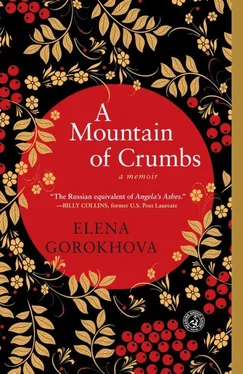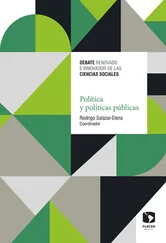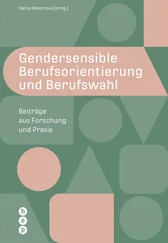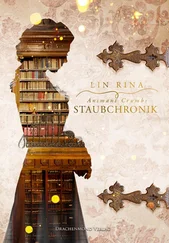I venture a guess that a paralyzed woman lives there. I see her in my mind, motionless and shriveled in her bed, yet still wicked, like an old, long-nosed witch from a tale of the brothers Grimm, or Baba Yaga from our own folktales, who lives in a hut that is perched on chicken legs.
Genka says that a paralyzed woman isn’t a grotesque enough inhabitant for such a place, that a more horrible defect must lurk behind the door, like a deaf child or a gnarled hunchback.
Or the garbageman, I say, and we both fall silent. We stand there, unblinking and petrified. Without doubt, the garbageman is scary enough—the scariest of all because he is real—to reside inside this dark tunnel where beads of moisture slither down the slimy stone walls.
He works in the cellar across from the playground, shoveling raw garbage dropped from each apartment through chutes. The smell of rotting trash leaks from under the cellar door and rises to the sidewalk, six cement steps up. On rare occasions he climbs the stairs to crouch on the ledge, always with his back to the sun. Gnome-like, with black stubble sprouting through his cheeks and a nose like a wilted red potato, he smokes hand-rolled cigarettes, which he crumples in his crooked fingers before lighting. His clothes are so soiled and permeated with the stink of garbage that his smell hangs in the air long after he is gone. I’ve always thought he sleeps in the cellar, somewhere in a little nook he cleared of potato peels and fish skeletons in his underground sea of decomposing trash.
But now, frozen in front of this black door, we both realize that this is the place where the garbageman must live, in the middle of this damp tunnel, in the eye of darkness, where we are no longer protected by sunlight or Zinaida Vasilievna or even screaming Aunt Polya.
Just as my heart is stumbling at this hideous thought, the door creaks, and its oilcloth slowly begins to separate from the stone frame, making Genka produce a sound as if he were choking on a bone. His eyes are two black o ’s, and we run as fast as we can, out of the tunnel, into the daylight of the playground and into the arms of our teacher, Zinaida Vasilievna.
She tells us to stand in front of her, straight up, arms down at attention, and explain why we are so special that we think we can just take off on our own. What makes you different from everyone else, she demands, from the rest of our collective, those who don’t run around looking for trouble? What makes you different from those who are content with the sandbox activities?
Back inside, as everyone is herded into the bathroom to sit on tin potties, Genka and I stand in opposite corners of the room. We are told to face the corner, so all I see is a patch of paint peeling off the wall. I wish I could talk to Genka and ask him if he saw anything through the crack in the door, any hint of the garbageman—a gnarled finger or a glimpse of the quilted sleeve of his filthy jacket—but I hear Aunt Polya’s lumbering steps and her voice behind me.
“Very good, Gorokhova,” she thunders, a smell of sour butter wafting into my corner, “first you don’t finish your soup, and now you run off where you please. Your mother, I’m sure, will be happy to hear this.”
If my mother finds out, I’ll face yet another corner, this one by the garbage chute in our kitchen, after a lecture on the need to march in step with the collective and on the perils of city streets. Serving my term of punishment by the garbage chute would be ironic, I think, especially knowing that the garbageman is six floors below, on the other end of the chute line, and that if I stand on my tiptoes and throw something down—anything, even an empty matchbox—it could land directly on his head and scare him, for a change.
The thought of scaring the garbageman makes me grin, but I bite my lip because I know Aunt Polya wants to see me upset and remorseful. I think of the worst thing that may happen, my cruelest possible punishment, the loss of a Sunday trip to the ice cream kiosk with my father: the ten-minute walk to Theatre Square, where from the frozen, steaming depths of a metal cart a morose woman lifts a waffle cup packed with ice cream called crème brulee, hard as stone.
“My mother has a sick heart,” I say. “If she finds out, she may have a heart attack.” This is only a half lie since I heard my mother complaining in the elevator to our neighbor that her heart isn’t what it used to be when she was young.
“That’s interesting,” says Aunt Polya. Still facing the wall, I can only sense her presence from the kitchen smell and the movement of air giving way when she speaks. “You didn’t happen to think about your mother’s sick heart when you ran off into the street, did you?”
“We didn’t go into the street,” I say gloomily. I am telling the truth, but Aunt Polya isn’t interested in the truth. She thinks I’m talking back to her.
“Listen well, Gorokhova,” she shouts in her lunch voice, “you’re a year away from real school, where they won’t be so lenient. They’ll kick you out with a dvoika in behavior, sick hearts or not.” I am old enough to know that dvoika is the lowest grade you can get in real school. “You’ll be lucky to end up sweeping the streets. I can just see you, an eighteen-year-old hooligan with a broom.”
Standing in the corner, I contemplate my bleak future so succinctly fleshed out by Aunt Polya, afraid that in first grade my teacher, my principal, and everyone else will know not to trust me because I am the one infamous for placing the interests of the collective beneath my own. I will fail consistently: in handwriting, in gym, in keeping my hands folded on the desk, in scrubbing my collar white and then stitching it onto my uniform dress. I will not be allowed to become a member of the Young Pioneers and wear a red kerchief around my neck. My place will always be in the corner in the back, away from the teacher’s attention, the place for those who cannot be relied on, for those with a dvoika in behavior. Aunt Polya will take care of that.
After an hour of standing, I am released from the corner. Later, when Aunt Polya is pouring milk as we sit around the table, she watches me more closely than usual to make sure I finish the bread. I know she’s watching me, she knows that I know, and I know she knows that I know. We play this little game for a while: she gives me an unexpected glance, and I chew diligently, pretending I don’t know she’s looking.
The game is called vranyo . My parents play it at work, and my older sister Marina plays it at school. We all pretend to do something, and those who watch us pretend that they are seriously watching us and don’t know we are only pretending.
The vranyo game of pretend chewing pays off. Neither Aunt Polya nor Zinaida Vasilievna ever tell my mother about my courtyard exploration, and on Sunday, my hand stuffed into my father’s, we stroll to the ice cream kiosk and back, hard chunks of crème brulee slowly melting on my tongue.
“WHAT DO YOU WANT to be when you grow up, Lenochka?” asks Aunt Nina, who is my real aunt, although once removed—my mother’s cousin. We are in Aunt Nina’s apartment for her birthday, six of us, my sister Marina sitting next to me at the table covered with salads, appetizers, and Aunt Nina’s special onion pie.
My sister Marina is seventeen: she is in her last year of high school and is concocting a plan to wrestle out of our parents their permission to apply to drama school.
“A ballerina,” I say, jumping out of my chair and raising my leg behind my back.
“Sit down,” says my mother, “and finish your potatoes.”
I don’t want any more potatoes. I’m saving room for the cake I glimpsed sitting in the kitchen, all studded with raisins and sprinkled with sugar.
Читать дальше












